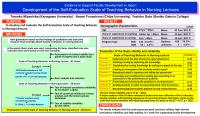Evaluation of an Objective Based Formative Clinical Evaluation Tool
Other Title(s)
Clinical Outcomes
View File(s)
Author Information
- Author(s)
- Details
-
Janie Best, DNP, RN, ACNS-BC, CNL; Annette Hines, PhD, RN, CNE
- Sigma Affiliation
- Mu Psi
Visitor Statistics
Visits vs Downloads
Visitors - World Map
Top Visiting Countries
| Country | Visits |
|---|
Top Visiting Cities
| City | Visits |
|---|
Visits (last 6 months)
Downloads (last 6 months)
Popular Works for Best, Janie by View
| Title | Page Views |
|---|
Popular Works for Best, Janie by Download
| Title | Downloads |
|---|
View Citations
Citations
The citations below are meant to be used as guidelines. Patrons must make any necessary corrections before using. Pay special attention to personal names, capitalization, and dates. Always consult appropriate citation style resources for the exact formatting and punctuation guidelines.
Item Information
Item Link - Use this link for citations and online mentions.
Abstract
Session presented on: Saturday, April 5, 2014: The co-investigators, as nurse educators, identified a problem with the current formative evaluation tool that was used in a beginning clinical course in a baccalaureate nursing program. Specifically, the students and faculty reported that the tool was a cumbersome list of expected behaviors and did not facilitate documentation of student learning in the clinical setting. Also, when using the current tool, students' reflection on the clinical experience was minimal. As students enter the clinical setting, it is important that they receive clear feedback and guidance regarding their clinical competence. Students need well-defined expectations for clinical performance and consistent evaluation in order to progress in the acquisition of clinical knowledge. In the study, the co-investigators described the effectiveness of a clinical evaluation tool that was used by both students and faculty. Three focus groups were conducted to gather data using semi-structured interview style questions. The focus groups were taped and transcribed. Line by line analysis of the data was performed with coding and the formation of themes. Participant checking was used to confirm the meaning constructed by the co-investigators. The study was approved by the Queens University of Charlotte Institutional Review Board and was funded by a grant from Mu Psi at-large chapter. The following themes were identified: value, confusion/need for guidance, differing clinical experiences, critical thinking, and self-efficacy. Implications for nursing education practice include: faculty role modeling, engaging students in reflective and critically thinking, promotion of student self-efficacy, building clinical competence based on effective faculty and student self-evaluation.
Description
Nursing Education Research Conference 2014 Theme: Nursing Education Research, held in Hyatt Regency Indianapolis
Repository Posting Date
2014-05-13T16:43:39Z
Notes
Items submitted to a conference/event were evaluated/peer-reviewed at the time of abstract submission to the event. No other peer-review was provided prior to submission to the Henderson Repository, unless otherwise noted.
Type Information
| Type | Presentation |
| Acquisition | Proxy-submission |
| Review Type | Abstract Review Only: Reviewed by Event Host |
| Format | Text-based Document |
Category Information
| Evidence Level | |
| Keywords | self-evaluation; clinical evaluation; focus groups |
Conference Information
| Name | Nursing Education Research Conference 2014 |
| Host | Sigma Theta Tau International, the Honor Society of Nursing; National League of Nursing |
| Location | Indianapolis, Indiana, USA |
| Date | 2014 |
Rights Holder
All rights reserved by the author(s) and/or publisher(s) listed in this item record unless relinquished in whole or part by a rights notation or a Creative Commons License present in this item record.
All permission requests should be directed accordingly and not to the Sigma Repository.
All submitting authors or publishers have affirmed that when using material in their work where they do not own copyright, they have obtained permission of the copyright holder prior to submission and the rights holder has been acknowledged as necessary.
Related items
Showing items related by title, author, creator and subjects.
-
Compare and contrast the clinical learning experiences of prelicensure baccalaureate nursing students, in a traditional group clinical, preceptored clinical and the DEU Model, utilizing the Cles-T Evaluation Tool
Connolly, Lesley L. (2016-03-21)Session presented on Saturday, November 7, 2015 and Sunday, November 8, 2015: Access of acute care sites for clinical education of nursing students is becoming a real problem for nursing schools around the world. Nursing ... -
Using focus groups to explore the facilitators and barriers of evidence-based nursing among clinical nurses
Wu, Ling-Yu; Hsu, Ching-Tai (2017-07-19)Background: The research on the facilitators and barriers of implementing evidence-based nursing (EBN) by nursing staff has been discussed overseas currently. However that application is limited for the clinical ... -
Evidence to support faculty development in Japan: Development of the self-evaluation scale of teaching behavior in nursing lectures
Miyashiba, Tomoko; Funashima, Naomi; Goto, Yoshiko (2016-03-17)Session presented on Sunday, July 26, 2015: Purpose: Lectures have been used in nursing education as an effective means to teach nursing knowledge and theory, and to connect these to practice. However, lectures tend to ... -
Japanese Disaster Nursing Readiness Evaluation Index (JDNREI)
Takayo, Maeda; Sayaka, Kotera; Nobuko, Matsuda; Carol Ann, HuebnerThe Japanese Disaster Nursing Readiness Evaluation Index (JDNREI) is an index purposed for nurses' self-evaluation on their readiness and preparation for dispatch to perform medical care at disaster sites. This scale is ... -
Evaluation and revision of a nursing professional practice model using focus group research methodology
Cobb, Susan C.; Jadwin, Anne E.; Wolf, Kathleen M. (2017-06-05)Purpose: The purpose of this presentation is to describe how focus group methodology can be successfully used to engage nurses in the evaluation and revision of a Nursing Professional Practice Model in a healthcare setting. A ...





